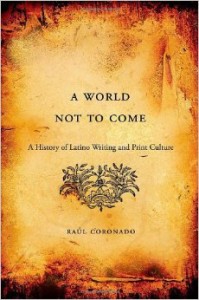Raúl Coronado, A World Not to Come: A History of Latino Writing and Print Culture (Harvard University Press, 2013) 555 pages.
(The previous entries for the roundtable can be found using the following links: Lilian Calles Barger’s introduction here, Philip Lorenz’s critique here, Tamar Herzog’s analysis here, and finally Ralph Bauer’s contribution here.)
Review by Beatriz Gonzalez-Stephan, Rice University
At various levels, A World Not to Come constitutes an extraordinary contribution to distinct and interconnected lines of scholarly debates engaged with Latin American and trans-hemispheric history. One of those lines of research, and perhaps the most notorious, has to do with filling a void in the historiography of the Spanish empire since 1808 and the events specific to the region of Texas (which made up part of the Eastern Interior Provinces with Nuevo Santander, Coahuila, and Nuevo León), faced with the theretofore unimagined possibility of constructing a modern state with all its possible contradictions. In other words, although the bibliography covering the process and wars of independence of Hispanic-America is abundant, the mediating space between the Mexico and the U.S., Texas, has been completely obliterated. Because Texas found itself in an interstitial space, in two peripheries (that of the Viceroyalty of New Spain and the frontiers of North America), at the mercy of neglect of Mexican governments, the victim of the avarice of Anglo settlers, at the same time the hegemonic narratives have obstructed the rich heritage of Hispanic Texas. To engage with the Spanish speaking Mexican-Tejano community of the region, and describe a key period for the trajectory of U.S. Latino culture, is to add to the historiography of the Hispanic culture on the continent.
Coronado states that his book does not deal with how Tejanos were conquered and colonized but how they thought to build a new order distinct from the ancient regime, where the received world was unquestioned, in the face of possibilities that provided the human being with agency of change without necessarily doing away with God or king. In a double effort between archeology and genealogy, Coronado’s narrative begins with the 1812 Texas revolt as a product of the many emancipatory currents across the American continent, which unleashed a worldwide civil war between competing social imaginaries, and debates of how to establish a new central authority without a king. Consequently Coronado focuses on the revolution created by print culture, the mass of Spanish language press produced in Texas, comprised of different formats from proclamations,  leaflets, manuscripts, manifestos, letters, dairies, and newspapers circulated in multiple ways, from public, collective readings, in private tertulias, salons, and civic societies which progressively altered and “seduced” the collective sensibilities by disseminating a new political language. Here the book is of interest for the history of publishing, circulation, reception, and the reading and appropriation in Hispano-American world.
leaflets, manuscripts, manifestos, letters, dairies, and newspapers circulated in multiple ways, from public, collective readings, in private tertulias, salons, and civic societies which progressively altered and “seduced” the collective sensibilities by disseminating a new political language. Here the book is of interest for the history of publishing, circulation, reception, and the reading and appropriation in Hispano-American world.
The research into archival materials on which the book is built is notable–which proves once again that the excavation of these archives written in Spanish leads Coronado, thanks to his careful close attention to the text’s semantic meaning, to propose what he calls an “alternative modernity,” and in this way to reestablish a tradition of a political culture more in keeping with the intellectual history of the Hispanic world and, in passing, that of the Mexican-Tejano too; a tradition that is more related to the Catholic Reformation, the new sciences of the [Hispanic—or at least not solely European] Enlightenment and the Scholastic thought of Francisco Suarez, than with the trajectory of Anglo-Protestant thought of the North-Atlantic countries. Textual genealogical and epistemological analysis (from the brothers Jose Antonio & Jose Bernado Gutierrez de Lara, Alvarez de Toledo, Miquel Ramos Arizpe, and the newspapers El Bejareno and El Rachero), which allows Coronado to establish the implications of the Spanish concepts of country, nation, “pueblo,” happiness, public welfare, a language that permeates this new literature and which becomes impertinent when translated into English. For example he demonstrates how the concept of the “pueblo” is very different from the literal translation to “town” in English.
In this sense, the most pertinent semantic genealogy of this literature does not proceed from the European Enlightenment writers, nor from the Anglo-Saxon revolutionary experience, while it is not unfamiliar with it, but rather it connects more directly with the thought of the scholastics. This is a decisive adjustment that helps Coronado establish an important political difference between the imagined new modern order of Anglo-Protestant society and how Hispanic-Catholics were able to image their corresponding futures: In the thought of Francisco Suarez the nation was conceived as corporate body, a corpus mysticum, a single body composed of the sum of families, and the happiness of this “multitude” consisting of a collective common good. Therefore political sovereignty resided in the social body (like the corpus mysticum) and not in the individual alone. But as natural law did not do away with God, or the king, the sovereignty of the people was transferred to a central authority. Therefore, in all the Texas sources of the period examined by Coronado, a democratic republic was not imagined, neither was it possible to imagine a new order in which liberty and common welfare were situated in the autonomous individual. This is the major epistemic difference between the modernity of liberal Anglo-Protestant North America, and these other “alternative modernities” rooted in Catholic tradition. One national project will emphasize the individual (the self) within economic liberalism, and others the community, the pueblo. This difference delineated by Coronado, has the unprecedented potential in understanding both the historical processes and the present of Latin American nations. And it is for these same reasons that the Tejano project of imagining themselves as an independent people, with a power of agency for their communal happiness, remained in the inkbottle and its dreams on paper. So as we said at the beginning of this review, under this heading, A World Not to Come is a cornerstone of the current debates over popular and state sovereignty, crucial in many regions of the globe. Coronado himself stresses that Anglo-American historiography suppresses from its foundational narratives not only this complex period in Texas; in other words, Tejano culture as present in Spanish language literature and archives was silenced and the year 1848 was mythified as the genesis of its history.
Consequently, the book also offers itself as a brilliant and suggestive methodological exercise that through a de-colonization process reestablishes the ideological significance of certain intellectual traditions, but also the proper agency of local histories. This is to say that it was not the influence of the North American revolution and its constitution, or the French Revolution, nor the ideas of Rousseau, Voltaire, and Locke, that began or energized the emancipatory process in regions of Hispanic America. There is no doubt that creole elite men of letters were familiar with this French and English literature in their original languages: although censored by the Spanish Crown and persecuted by the Inquisition, the books and manuscripts avoided these impediments, and continued to circulate among Atlantic networks, passing through Caracas, Bogota, Cuba, Vera Cruz, San Antonio, Nacogdoches, Philadelphia, New Orleans, returning through Texas, and circulating along the Gulf coast and the Caribbean of New Spain.
A World Not to Come offers readers the complex ideological process of Tejanos during a relatively brief period of time after the 1812 revolt, along with Mexico’s process of emancipation (the Cry of Hidalgo), the painful and difficult process of declaring themselves independent through print culture, the progressive annexation into the United States (1846-1848) after years of peaceful resistance through the printing press to challenge the racial harassment of Anglo-Americans and to reconfigure only through language and text their autonomous identity as a community. – Translated from the Spanish.
Beatriz González-Stephan is currently the Lee Hage Jamail Chair of Latin American Literature and professor in the Department of Spa nish & Portuguese at Rice University. She was the 1987 recipient of the Casa de las Americas literary prize for the best Latin American literature for her work La Historiografía Literaria Del Liberalismo Hispanoamericano Del Siglo XIX. She has published eight books and her forthcoming work is The Body Politic: Writing the Nation in Nineteenth-Century Venezuela.
nish & Portuguese at Rice University. She was the 1987 recipient of the Casa de las Americas literary prize for the best Latin American literature for her work La Historiografía Literaria Del Liberalismo Hispanoamericano Del Siglo XIX. She has published eight books and her forthcoming work is The Body Politic: Writing the Nation in Nineteenth-Century Venezuela.

0